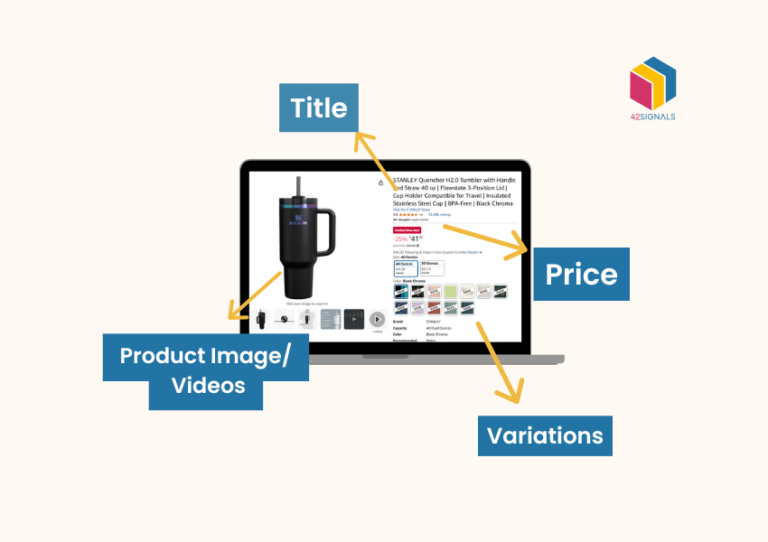Did you know there are around 5.9 million Google searches happening every single minute? With such staggering numbers, ensuring your online content resonates with potential customers has never been more critical. At the heart of any robust SEO approach lies rigorous keyword research, essentially dissecting what words people type into search bars when they look for specific items online.
As far as e-commerce goes, mastering this technique provides valuable insights about consumers’ needs, guides content creation plans, and significantly improves your chances of appearing atop search results.
In other words, smart keyword selection paves the way for greater visibility among interested parties, potentially steering more targeted traffic toward your site and fueling business growth.
5 Keyword Research Strategies for E-commerce Mastery
1. Leveraging AI and Machine Learning for Predictive Keyword Analysis

Image Source: Faster Capital
E-commerce professionals now harness the predictive power of AI and Machine Learning to enhance keyword research.
By analyzing vast sets of search data, these technologies can:
- Identify emerging trends before they become mainstream
- Predict seasonal keyword shifts
- Suggest long-tail keyword opportunities tailored to a specific niche
- Gauge consumer sentiment and intent more accurately
Incorporating these insights into your keyword strategy enables you to stay ahead of competitors and connect with your audience more effectively.
2. The Power of Long-Tail Keywords in Niche Targeting

Image Source: Semrush
In the bustling digital marketplace, e-commerce vendors vie for visibility.
One highly effective strategy to stand out is leveraging long-tail keywords—specific, often longer phrases with less search traffic but higher conversion rates.
These precise queries capture users with definitive intentions, dramatically narrowing the competition.
- Niche businesses benefit from long-tail keywords as they match unique offerings to equally unique search inquiries.
- Retailers targeting specific demographics find these keywords invaluable; they connect needs to solutions with laser-focused accuracy.
- Intelligent use of long-tail keywords aligns content with user intent, inspiring trust and fostering customer loyalty.
Essentially, long-tail keywords serve as the powerful ace up the sleeve for e-commerce ventures aiming to conquer specialized niches.
3. Utilizing Voice Search Trends for Keyword Research Optimization

Image Source: Scaleflex
With the proliferation of digital assistants, optimizing for voice search has become crucial. To leverage this trend:
- Understand natural language patterns and frame keywords as questions users might ask.
- Incorporate long-tail keywords that align with conversational speech.
- Optimize local SEO by including phrases like “near me” since many voice searches are location-based.
- Ensure content readability, aiming for a conversational tone that matches voice search queries.
- Analyze voice search data to determine user intent and optimize keywords to match these insights.
Adapting to voice search trends can enhance visibility and drive e-commerce success.
4. Competitor Keyword Analysis for Strategic Insight
Understanding what keywords competitors are targeting affords e-commerce businesses a strategic vantage point. This analysis involves:
- Identifying top competitors’ keyword research strategies using tools like SEMrush or Ahrefs.
- Analyzing the keyword gaps and opportunities where your e-commerce site can outperform rivals.
- Monitoring competitors’ new and lost keywords regularly to stay ahead in the ranking game.
- Observing PPC keywords that competitors bid on to infer their most valued search terms.
- Leveraging competitors’ keyword data to refine and enhance your own SEO and content marketing efforts.
Competitor analysis serves as an intelligence tool, revealing market shifts and consumer interests and guiding strategic decisions.
5. Integrating Customer Feedback and Social Listening into Keyword Discovery
Prioritizing customer input and attentiveness to social chatter ought to be integral components of e-commerce entities’ keyword research tactics.
Delving into customer evaluations, remarks, and discussions transpiring on social media platforms allows firms to detect the expressions and phrases employed by shoppers when articulating opinions about their offerings and encounters.
- Utilize data from reviews to identify frequently mentioned features or pain points.
- Monitor social media for trending topics and hashtags relevant to your industry.
- Leverage customer surveys to ask direct questions about search behavior.
- Implement social listening tools to automate the tracking of brand mentions and industry keywords.
- Analyze forum discussions in your niche to identify specialized language and emerging trends.
Incorporating these insights into keyword discovery helps align content with real customer interests, boosting visibility and relevance in search engine results.
The Role of Analytics in Refining Your Keyword Research Strategies
In e-commerce, data-driven decision-making is paramount. Analytics serve as a compass, guiding retailers to:
- Understand customer behavior patterns and preferences.
- Gauge the performance of current keyword strategies.
- Identify high-conversion keywords and eliminate underperforming ones.
- Monitor competitor keyword performance and market trends.
- Adjust strategies in real time based on actionable insights.
Analytics empower e-commerce businesses to continuously refine and evolve their keyword strategies, ensuring alignment with consumer search behaviors and maximizing ROI on marketing efforts.
Final Thoughts on Staying Ahead in E-commerce Keyword Research
When it comes to e-commerce, navigating the ever-changing digital landscape requires both nimbleness and forward-thinking to keep up with fierce competition in keyword research.
To truly thrive, retailers should not only familiarize themselves with emerging trends and cutting-edge tools but also maintain a profound connection with their clientele.
Doing so enables these businesses to predict shifts in consumer habits proactively.
Beyond traditional methods, diversifying one’s keyword game plan becomes increasingly vital; incorporating long-tail queries, optimizing for voice searches, and harnessing data analytics contribute significantly to success.







